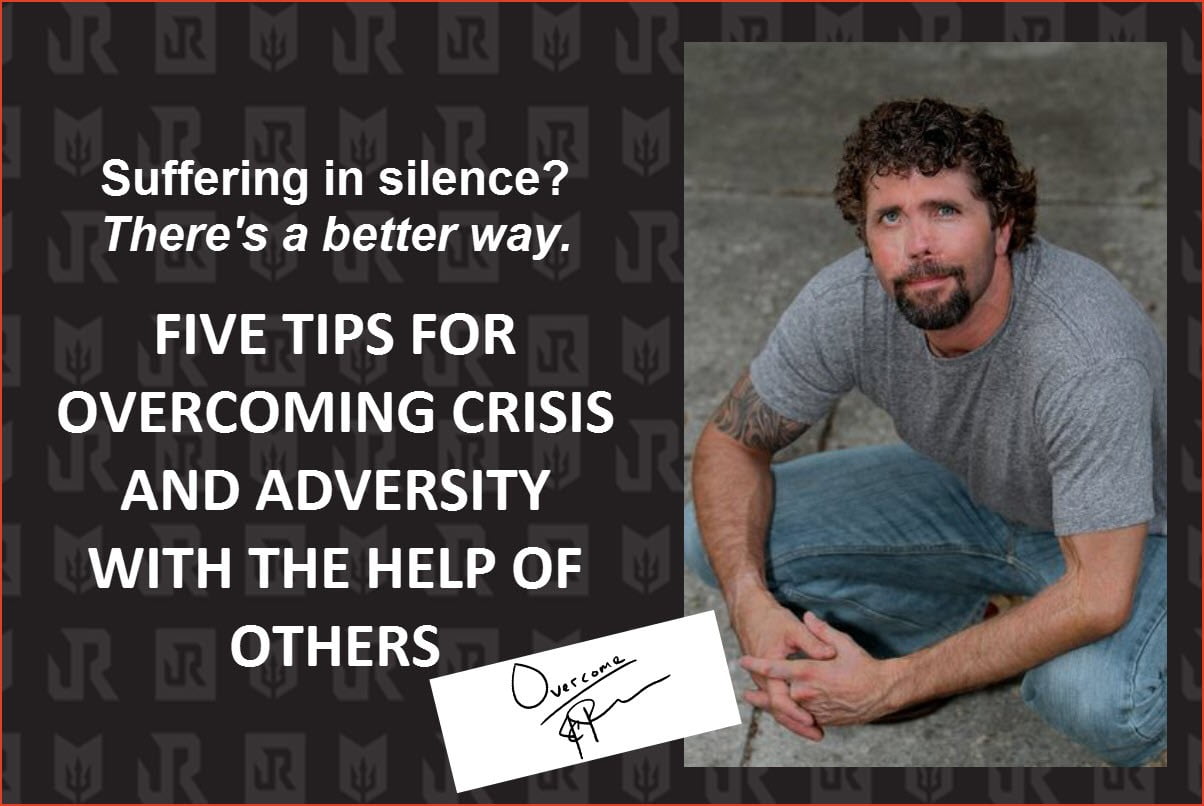How and Why to Not Suffer in Silence: Five Tips for Overcoming Crisis and Adversity With the Help of Others
Silence can be sweet. It’s devoid of chaos and distractions from external sources, which helps clear the mental-emotional space needed for reflection, introspection, and internal peace and development.
But suffering in silence is altogether different. It’s an arena for chaotic collisions of the mind and heart that crush the wills and conquer the ambitions of good people every day.
Fortunately, if you’re in crisis, you have more control than you may realize. Right now, you can exit that negative arena and find another location where thoughts and perspectives can move in a positive direction.
Fair warning: It will involve courage, acceptance, a level of willful exposure and exceptional trust.
Here’s how you can join the ranks of those who have gone before you, stepped out of their comfort zones and walked that extra mile to where suffering meets the sunlight and compassion and confidence pave the road ahead.
1. Have a mission and a purpose
If you’re an Overcome Army member, you’ve already been guided to define yours and begin living it.* But when a catastrophic event occurs, it can be hard to reconcile if and how the crisis might impact your big plans.
It’s worth some reflection: What had I envisioned as my purpose? What was my mission, anyway? Is my mission and/or purpose aligned with my values? Are my values still the same despite this crisis?
As hard as it may be to believe, it’s possible that your current situation might actually align with the purpose and mission you’re already pursuing. Take time to reassess it all, then imagine how your new challenge fits into the big picture and what you can do with it to help fuel, further and enhance your mission in line with your predetermined purpose.
If you can envision your mission unfolding on that path, go with it.
But if the crisis just doesn’t fit that picture no matter how you frame it, that’s OK too. We just need to take a step back and reassess.
When I teach the Overcome Mindset principles (new online course set for spring 2021**), I talk about quitting vs. “falling back” when on a mission.
Quitting guarantees failure, but falling back is taking the opportunity when something’s not going as planned to regroup for a new chance at success.
Falling back enables a person or team to relax at a secure point, reassess the situation, reevaluate assets, and decide with new information and clarity whether and how to reengage, reattack or pivot to a different direction. The long-range mission objective remains, but something about the course to its end needs to change.
That’s life, right?
Often, yes. Yet sometimes a catastrophic event changes everything — even one’s original purpose and mission.
That’s life, too. And when that’s the case, it’s important to see this, also, as an opportunity to fall back rather than as a call to quit, even if you have to reevaluate and redefine everything you had previously thought, known or defined.
Because sometimes it is within the crisis and adversity that we discover a completely new mission or purpose. It could be anything from, “I will never let this happen to me again” or “I’ll do my best to prevent what happened to me from happening to someone else” to “I want to be able someday to help others through what I’m working through now — or, even better, to teach them how to avoid it — because I know how terrible it can be.”
So rather than attempt to “silence” yourself in suffering, ask yourself something empowering: Could it be that this traumatic event, or an event that I might endure in the future, reforms my purpose and creates my next mission? Could my new purpose be to lead myself out of the darkness in order to not only help me but also to become a light in that same darkness for someone else who needs it?
That’s an incredible way to accept your suffering for exactly what it has the potential to be: A temporary state through which you will come to the other side stronger, wiser, more self-defined and in a prime position to lead yourself and others toward better things.
2. Have a destination and a course
If you have a mission and a purpose, you’ll have to set destinations and courses, or waypoints, along the way. You’ve got to know where you’re going, so these are your shorter-term goals toward your long-term objectives. (I teach these exact principles in my forthcoming Pointman for Life course.)
If you’re not sure what they should look like, or even what they should accomplish, talk it out. Who in your life has been, or might be if asked, a trusted advisor, a mentor, or what I call a “Pointman” for his or her own life who can help you identify the most efficient paths and avoid known danger points on your long-range mission? Break your silence and reach out to them for what insights and guidance they can offer. It may take more than a handful of requests to find one or more who can presently respond. For every one who cannot, reach out to two more who might.
If you’re currently “on the X,” as we say in the military, your first and definitively most important destination — or perhaps alternative mission for now — will be to get off the X!**
Then you can realign back to your primary mission and begin moving the needle toward achievement of subsequent goals.
3. Have courage and conviction
This is big. It’s so easy to fear that people will judge you poorly if you’re honest about your situation and the adversity you are facing.
And some people might — there will always be haters and naysayers who make judgments from fragments of information. Ignore them, lest it become fertile ground for the pervasive roots of self-doubt to thrive.
Remember: You’ve already turned your back on the negativity. They are the minority, they don’t know any better, and their negativity doesn’t deserve your time or attention.
Your mission deserves your attention. It is your light in the dark. Your lighthouse in the storm.
So break that cycle of fear. Have the conviction to stay your course and the courage to be honest about the adversity along the way. Don’t let fear or pride prevent you from making significant progress by talking openly with those who care and can help.
We’ve all been through tough times, and most people don’t want to see others suffer. Maybe you don’t know anyone who can directly relate to your situation, but chances are that you know someone who knows someone else who’s been there — maybe someone whose own new mission then became helping someone like you through it in the future.
Get it?
Keeping it all inside is unproductive and unhealthy. Suffering in silence not only deprives you of support and inspiration when you need it most, but it also deprives others who might benefit from learning from or assisting you on this course.
Courage and conviction can be cathartic.
4. Have teammates, or a "tribe"
If you’re a member of the Overcome Army, that’s your tribe. And you understand how essential it is to have that strong tribe, or team. None of us can always be the strongest. No matter how strong we have been in the past or think we’ll always be, sometimes we need help. And we lean on others to help us. That’s not a sign of weakness, that’s a sign of humanity at its best.
As we’ve discussed in the Overcome Army, the mind can be the most dangerous battlefield. And when you’re enduring what I call a “life ambush,” and you’ve suffered trauma, and you make the choice to suffer in silence, the mind wreaks havoc.
Don’t suffer in silence and isolation. That only makes things worse. That night I was on the X in Iraq, critically wounded and near death by an enemy ambush, I couldn’t have fought back or gotten off that battlefield to safety by myself.
I use this term sparingly, but it applies quite literally in this case: It would have been impossible.
I was out of the fight, drifting in and out of consciousness as I continued to lose more and more blood. If it hadn’t been for my teammates, who fought for our victory and then got us to the Medevac, I wouldn’t be here today. No matter how strong, smart or otherwise “prepared” I had been or wanted to be, I was simply physically unable to win either the firefight or the subsequent fight for my life by myself. I literally owe my life to them.
Build your teams, join your tribes, and surround yourself with positive, mutually supportive people.
It’s a mission-critical mandate.
5. Have faith
And this may be the toughest charge: maintaining positivity in the face of extreme negativity and misfortune. Granted, keeping the faith can be a challenge some days, especially when we’re suffering. Even some of the “strongest” religious leaders I’ve met say they’ve struggled to rely on their own at times.
But that’s what makes us human, and the strongest do it anyway. Because that’s the very nature of faith.
When yours wanes, put it into perspective: The nature of faith is its independence of things like “proof,” “statistics” and history. And it’s not some elusive miracle machine that works for some people and not others.
Faith is simply the belief in something that can make us better, something that can guide us through the storm. So when you’re in crisis, when you’re suffering some sort of trauma, have faith that you’re going to drive through it, you’re going to find the answers and get to the other side.
Have faith in yourself. Have faith in others who are ready and waiting to help you if take the first step: Stop suffering in silence.
With faith in you and your ability to “Lead Always and Overcome All,”
Jason Redman
* For guidance in defining your personal or professional mission, check out my article “Creating a Mission Statement the Pointman Way.”
** In the military, “X” is the point of ambush or attack, and your life depends on getting off the X. Civilian life is no different. What I call life-ambushes are inevitable; we all endure them in a lifetime. They range from micro to mini to major, marked by anything from our own negative mindsets or relatively minor schedule interruptions to the most devastating or traumatic events that leave physical, mental and/or emotional scars.
I’ve endured them all, and you can too. For help getting off X, building the Overcome Mindset, or strengthening your personal and/or professional leadership for life, join the Overcome Army or a course or coaching program that’s right for you at www.getoffx.com



